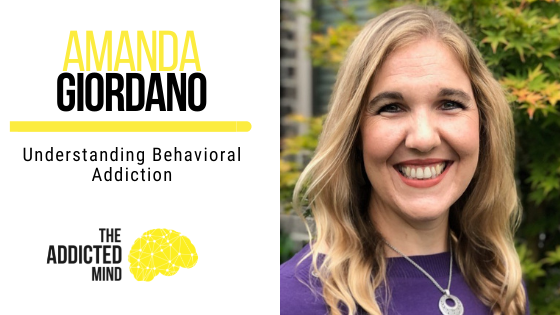There are a lot of negative consequences that can come from behavioral addictions. They include everything from financial problems to legal repercussions to health issues. Whether it’s gambling, gaming, sex, or pornography, it’s important to understand why some people are susceptible to certain behaviors. In fact, the same mechanism that influences chemical addiction could be responsible for behavioral addiction as well.
On this episode, Duane speaks with Amanda Giordano, a licensed professional counselor and associate professor at the University of Georgia, who specializes in addiction counseling both in chemical addiction and behavioral addiction. Amanda is the author of a clinical reference book titled A Clinical Guide to Treating Behavioral Addictions.
Today, she imparts her expertise in this field, explaining how the changes in the brain associated with behavioral addictions are actually very similar to the changes associated with chemical addictions.
In other words, instead of becoming addicted to a chemical that originates outside of the body, the body is addicted to the release of its own neurochemicals (dopamine in particular). Once the brain’s reward system is activated, it releases neurotransmitters which can become very difficult for some people to abstain from as they become their primary means of regulating their emotions.
Hence, for some susceptible individuals, a rewarding behavior can become an addiction where there’s a loss of control over that behavior. The behavior is continued despite negative consequences and it becomes compulsive for that individual. They experience cravings or a mental preoccupation with the behavior when they’re not engaging in it.
When we understand the neuroscience behind it, we can have a lot more empathy for people with addiction because we can now understand that their experience might be very different from the experience of someone who is not genetically predisposed to addiction.
Amanda also talks about how to distinguish behavioral addiction from just a high involvement in the behavior by looking for the 4 C’s of addiction.
In this episode, you will hear:
- How a rewarding behavior can become an addiction
- Different types of behavioral addiction
- Resetting the brain takes time
- The 4 C’s of addiction
- The behavior becoming the salient part of their life
- Proven effective methods of treatment
- Factors that influence the susceptibility to behavioral addiction
- Positive reinforcement vs. negative reinforcement
- The three circles technique to identify the warning signs
Follow and Review:
We’d love for you to follow us if you haven’t yet. Click that purple ‘+’ in the top right corner of your Apple Podcasts app. We’d love it even more if you could drop a review or 5-star rating over on Apple Podcasts. Simply select “Ratings and Reviews” and “Write a Review” then a quick line with your favorite part of the episode. It only takes a second and it helps spread the word about the podcast.
Supporting Resources:
Email: amanda.giordano@uga.edu
Amanda’s blog:
https://www.psychologytoday.com/intl/contributors/amanda-l-giordano-phd-lpc
A Clinical Guide to Treating Behavioral Addictions:
https://www.amazon.com/Clinical-Guide-Treating-Behavioral-Addictions/dp/0826163165
Diagnostic and Statistical Manual of Mental Disorders (DSM-5):
https://www.amazon.com/Diagnostic-Statistical-Manual-Mental-Disorders/dp/0890425558
Irresistible by Adam Alter:
https://www.amazon.com/Irresistible-Addictive-Technology-Business-Keeping/dp/1594206643
Episode Credits
If you like this podcast and are thinking of creating your own, consider talking to my producer, Emerald City Productions. They helped me grow and produce the podcast you are listening to right now. Find out more at https://emeraldcitypro.com Let them know we sent you.
You can support the Addicted Mind Podcast by purchasing through our affiliate links.
Above are affiliate links, this means that if you purchase something, The Addicted Mind Podcast will earn a commission. This commission does not cost you anything. This commission helps offset the cost of running The Addicted Mind Podcast and enables me to continue to create meaningful and helpful content. Thank you for your continued support.

